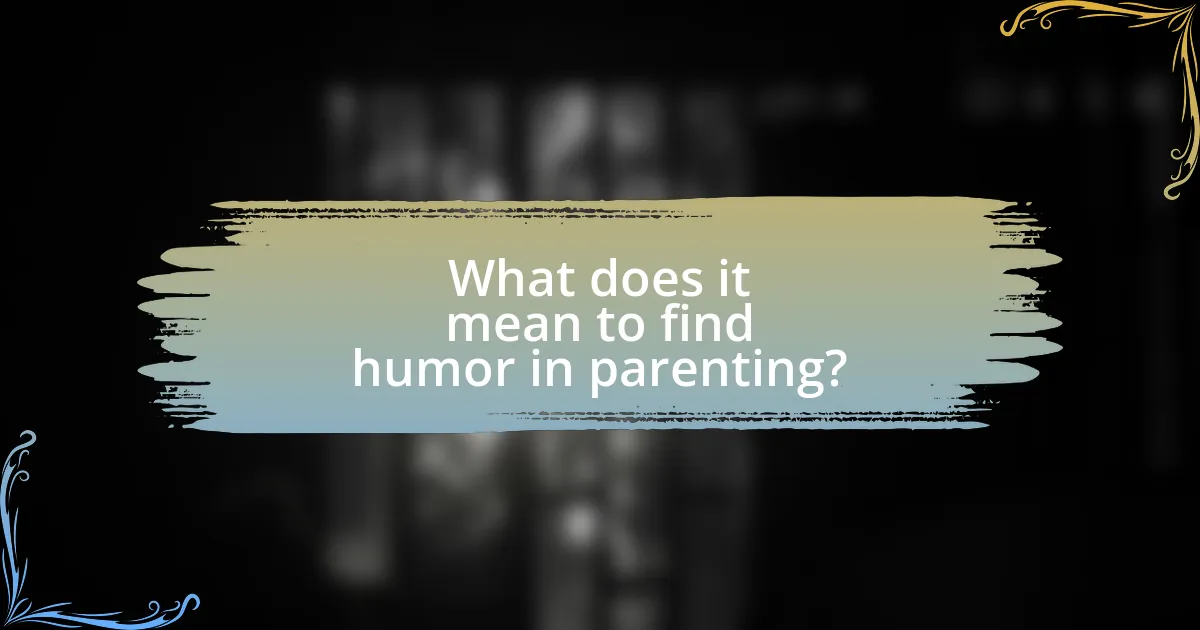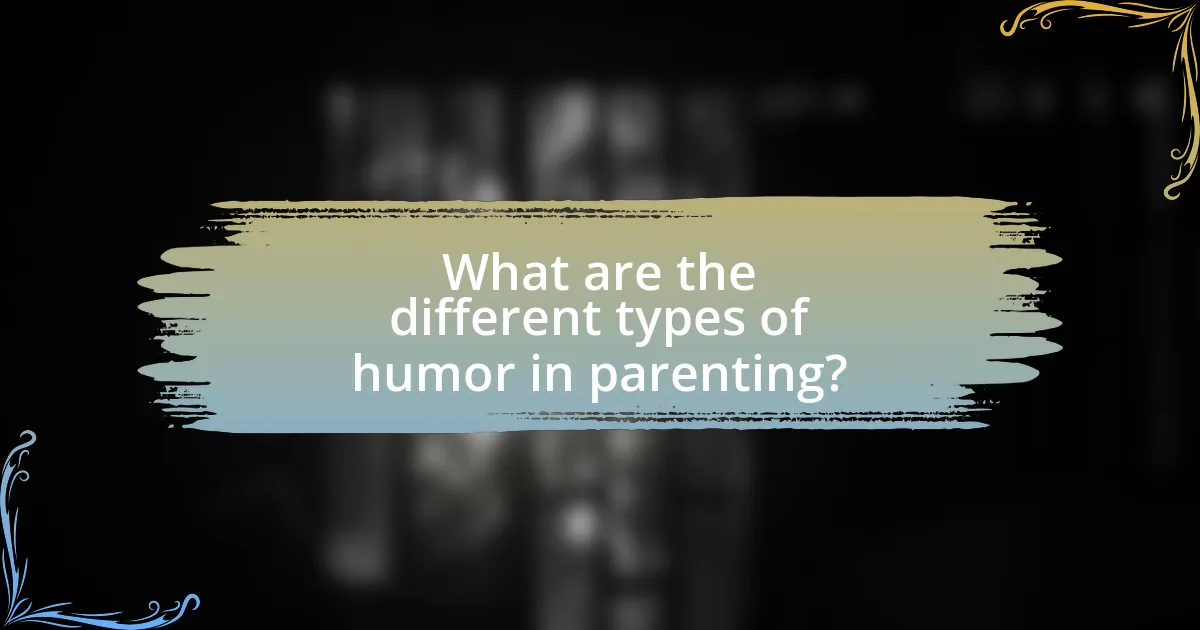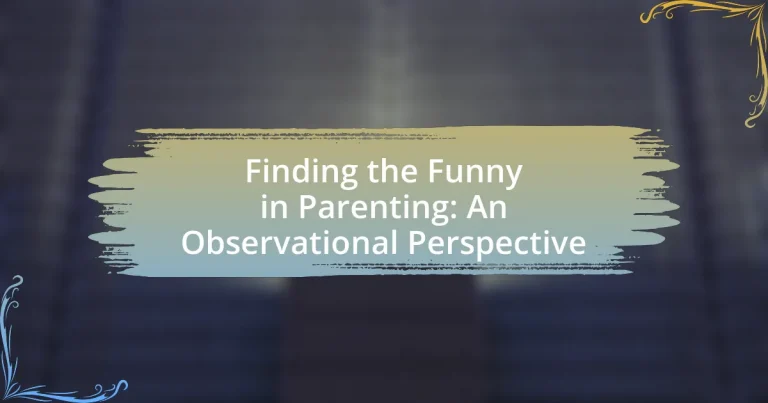The article “Finding the Funny in Parenting: An Observational Perspective” explores the significance of humor in parenting, emphasizing its role in alleviating stress and enhancing family dynamics. It discusses how humor can serve as a coping mechanism, improve communication, and strengthen parent-child relationships through shared laughter. The article also examines various types of humor, such as self-deprecating and situational humor, and provides practical strategies for parents to cultivate a humorous outlook in daily challenges. Additionally, it highlights the potential pitfalls of humor in parenting, including miscommunication and undermining authority, while offering tips for effectively incorporating humor into parenting practices.

What does it mean to find humor in parenting?
Finding humor in parenting means recognizing and appreciating the absurdities and challenges of raising children, which can alleviate stress and foster resilience. This perspective allows parents to navigate difficult situations with a lighter heart, transforming potential frustrations into moments of laughter. Research indicates that humor can enhance emotional well-being and strengthen family bonds, as it encourages open communication and shared experiences among family members.
How can humor alleviate the stresses of parenting?
Humor can alleviate the stresses of parenting by providing a coping mechanism that reduces anxiety and fosters connection. When parents engage in humor, it can lead to the release of endorphins, which are chemicals in the brain that promote feelings of happiness and relaxation. Research indicates that laughter can lower cortisol levels, a hormone associated with stress, thereby creating a more positive environment for both parents and children. Additionally, shared laughter strengthens familial bonds, enhancing communication and reducing feelings of isolation, which are common stressors in parenting.
What are some common parenting challenges that humor can address?
Humor can effectively address common parenting challenges such as stress management, communication barriers, and discipline issues. For instance, humor can alleviate stress by providing a light-hearted perspective on daily parenting struggles, which has been shown to reduce anxiety levels in both parents and children. Additionally, humor can enhance communication by breaking down barriers, making it easier for parents to connect with their children during difficult conversations. Research indicates that using humor in discipline can lead to more positive outcomes, as it encourages cooperation and reduces resistance from children.
How does laughter impact the parent-child relationship?
Laughter significantly enhances the parent-child relationship by fostering emotional bonding and reducing stress. When parents and children share laughter, it creates a positive atmosphere that encourages open communication and strengthens their connection. Research indicates that laughter triggers the release of endorphins, which promote feelings of happiness and relaxation, thereby improving the overall quality of interactions between parents and children. Additionally, a study published in the Journal of Family Psychology found that families who engage in playful activities, including humor, report higher levels of satisfaction and cohesion, highlighting the importance of laughter in nurturing healthy family dynamics.
Why is an observational perspective important in parenting humor?
An observational perspective is important in parenting humor because it allows parents to identify and reflect on the everyday challenges and absurdities of raising children. This perspective fosters relatability, as parents often share similar experiences, making humor a tool for connection and support. Research indicates that humor can alleviate stress and enhance coping mechanisms in parenting, as noted in studies published in the Journal of Family Psychology, which highlight the benefits of shared laughter in strengthening familial bonds. By observing and humorously commenting on parenting situations, parents can create a sense of community and validate each other’s experiences, ultimately promoting mental well-being.
What insights can be gained from observing parenting moments?
Observing parenting moments provides insights into the dynamics of parent-child interactions, revealing emotional responses, communication styles, and behavioral patterns. These observations can highlight how parents use humor to diffuse stressful situations, fostering resilience and emotional intelligence in children. Research indicates that laughter during parenting can strengthen bonds and improve family cohesion, as seen in studies that link positive emotional exchanges to better developmental outcomes in children.
How does observation enhance the understanding of parenting dynamics?
Observation enhances the understanding of parenting dynamics by providing direct insights into parent-child interactions and behaviors. Through systematic observation, researchers can identify patterns in communication, emotional responses, and conflict resolution strategies that characterize different parenting styles. For instance, a study published in the Journal of Family Psychology found that observational methods revealed significant differences in how authoritative and permissive parents engage with their children, impacting children’s social development and emotional regulation. This empirical evidence underscores the value of observation in capturing the nuances of parenting that surveys or self-reports may overlook, thereby enriching the understanding of how parenting dynamics function in real-life contexts.

What are the different types of humor in parenting?
The different types of humor in parenting include playful humor, self-deprecating humor, situational humor, and sarcastic humor. Playful humor involves engaging children in light-hearted activities or jokes that foster bonding and joy. Self-deprecating humor allows parents to laugh at their own mistakes, making them relatable and approachable to their children. Situational humor arises from everyday parenting challenges, turning stressful moments into funny anecdotes that can ease tension. Sarcastic humor, while often more adult-oriented, can provide a humorous perspective on parenting struggles, though it should be used cautiously to avoid misunderstandings with children. Each type of humor serves to enhance family dynamics and create a positive atmosphere in the home.
How do parents use self-deprecating humor?
Parents use self-deprecating humor by making light of their own parenting mistakes and shortcomings, which helps to create a relatable atmosphere for both themselves and their children. This approach not only diffuses tension during challenging parenting moments but also fosters open communication and emotional connection within the family. Research indicates that self-deprecating humor can enhance relationships by promoting empathy and understanding, as it allows parents to model humility and resilience.
What are the benefits of self-deprecating humor in parenting?
Self-deprecating humor in parenting fosters a positive family environment by promoting relatability and reducing stress. When parents use self-deprecating humor, they demonstrate vulnerability, which can strengthen their connection with children and encourage open communication. Research indicates that humor can alleviate tension and create a more relaxed atmosphere, making it easier for children to express their feelings and concerns. Additionally, self-deprecating humor can model resilience, teaching children that it is acceptable to make mistakes and laugh at oneself, which is crucial for emotional development.
How can self-deprecating humor foster connection with children?
Self-deprecating humor can foster connection with children by creating an atmosphere of relatability and openness. When parents use self-deprecating humor, they demonstrate vulnerability, which encourages children to feel safe in expressing their own insecurities and mistakes. This type of humor can break down barriers, making parents appear more approachable and less authoritative, thus promoting a sense of camaraderie. Research indicates that humor can enhance emotional bonds; for instance, a study published in the Journal of Family Psychology found that families who engage in playful interactions, including humor, report higher levels of satisfaction and connection. Therefore, self-deprecating humor serves as a tool for parents to strengthen their relationship with their children by fostering trust and understanding.
What role does situational humor play in parenting?
Situational humor plays a crucial role in parenting by enhancing communication and strengthening the parent-child bond. It allows parents to diffuse stressful situations, making challenges more manageable and fostering a positive atmosphere. Research indicates that humor can improve emotional resilience in children, as it encourages them to view difficulties with a lighter perspective. For instance, a study published in the Journal of Family Psychology found that families who engage in humorous interactions report higher levels of satisfaction and cohesion. This demonstrates that situational humor not only alleviates tension but also contributes to a nurturing environment essential for healthy child development.
How can everyday situations become sources of humor?
Everyday situations can become sources of humor through the relatability and absurdity inherent in daily life experiences. For instance, common parenting challenges, such as dealing with a toddler’s tantrum or miscommunication with a partner, often lead to unexpected and humorous outcomes that resonate with many individuals. Research indicates that humor often arises from incongruity, where the unexpected nature of a situation creates a comedic effect. This is evident in parenting scenarios where the mundane becomes exaggerated, such as a parent struggling to assemble a toy while their child plays with the box. Such moments highlight the shared struggles of parenting, making them relatable and funny to others.
What are some examples of situational humor in parenting?
Situational humor in parenting often arises from unexpected or relatable scenarios that highlight the challenges and absurdities of raising children. For example, a parent might find humor in the chaos of a toddler throwing a tantrum in a public place, where the exaggerated reactions of both the child and the onlookers create a comedic atmosphere. Another instance is when a parent accidentally wears mismatched shoes while rushing to drop their child off at school, leading to laughter from both the parent and the child. These moments reflect the unpredictability of parenting and the ability to find joy in everyday mishaps, illustrating how humor can serve as a coping mechanism in the face of parenting challenges.

How can parents cultivate a humorous perspective?
Parents can cultivate a humorous perspective by actively seeking and sharing funny moments in daily life. Engaging in playful interactions, such as joking with children or using light-hearted banter, fosters an environment where humor thrives. Research indicates that humor can enhance family bonding and reduce stress, as noted in a study published in the Journal of Family Psychology, which found that families who share laughter report higher levels of satisfaction and cohesion. By modeling a light-hearted approach to challenges and encouraging children to find humor in everyday situations, parents can effectively nurture a humorous outlook within the family.
What strategies can parents use to find humor in daily challenges?
Parents can use several strategies to find humor in daily challenges, such as reframing situations, sharing experiences with others, and practicing self-deprecating humor. Reframing involves viewing a frustrating moment from a different perspective, which can highlight the absurdity of the situation and elicit laughter. For example, a messy house can be seen as a sign of a lively household rather than a source of stress. Sharing experiences with other parents can also foster a sense of community and provide comic relief, as many parents face similar challenges. Additionally, self-deprecating humor allows parents to laugh at their own mistakes, making them feel more relatable and easing the pressure of perfectionism. Research indicates that humor can reduce stress and improve emotional well-being, making these strategies effective in navigating the ups and downs of parenting.
How can mindfulness contribute to a humorous outlook on parenting?
Mindfulness can contribute to a humorous outlook on parenting by fostering present-moment awareness, which allows parents to recognize the absurdities and unexpected moments in daily life. This heightened awareness helps parents detach from stress and view challenging situations with a lighter perspective, making it easier to find humor in the chaos of parenting. Research indicates that mindfulness practices can reduce stress and enhance emotional regulation, enabling parents to respond to situations with laughter rather than frustration. For instance, a study published in the Journal of Child and Family Studies found that parents who practiced mindfulness reported higher levels of positive emotions and greater satisfaction in their parenting roles, which can lead to a more humorous approach to parenting challenges.
What practices can help parents embrace the lighter side of parenting?
Parents can embrace the lighter side of parenting by incorporating humor into daily routines. Engaging in playful activities, such as silly games or light-hearted storytelling, fosters a joyful atmosphere. Research indicates that laughter can reduce stress and improve family bonding, as evidenced by a study published in the Journal of Family Psychology, which found that families who laugh together report higher levels of satisfaction and cohesion. Additionally, sharing funny parenting moments with friends or on social media can create a supportive community, reinforcing the idea that parenting challenges are universal and often humorous.
What are the potential pitfalls of humor in parenting?
The potential pitfalls of humor in parenting include miscommunication, inappropriate timing, and the risk of undermining authority. Miscommunication can occur when humor is misunderstood by children, leading to confusion about expectations or boundaries. Inappropriate timing, such as using humor during serious discussions, can diminish the gravity of important messages. Additionally, excessive humor may cause children to perceive their parents as less authoritative, which can lead to behavioral issues. Research indicates that while humor can foster a positive family environment, it must be balanced with clear communication and appropriate seriousness to avoid these pitfalls.
How can humor be misinterpreted by children?
Children can misinterpret humor due to their developmental stage and limited understanding of social cues. Their cognitive abilities may not yet allow them to grasp sarcasm, irony, or complex jokes, leading to confusion or literal interpretations. For example, a child might take a playful comment about being “as slow as a turtle” literally, rather than understanding it as a humorous exaggeration. Research indicates that children under the age of 7 often struggle with understanding humor that relies on abstract concepts or wordplay, as their cognitive development is still focused on concrete thinking. This misinterpretation can result in children feeling excluded or not understanding social interactions, highlighting the importance of age-appropriate humor in communication.
What should parents avoid when using humor in parenting?
Parents should avoid using humor that belittles or mocks their children. Such humor can damage a child’s self-esteem and create feelings of inadequacy. Research indicates that humor that targets a child’s vulnerabilities can lead to negative emotional outcomes, as children may internalize the jokes and feel unsupported by their parents. Additionally, parents should refrain from using sarcasm, as it can be misinterpreted by children and may foster confusion rather than laughter.
What practical tips can parents implement to find humor in parenting?
Parents can implement practical tips such as embracing spontaneity, sharing funny stories, and using playful language to find humor in parenting. Embracing spontaneity allows parents to appreciate unexpected moments, like a child’s silly dance or a humorous mishap, which can lighten the mood. Sharing funny stories with family and friends creates a supportive environment where laughter is encouraged, reinforcing the idea that parenting is a shared experience filled with amusing challenges. Additionally, using playful language, such as silly nicknames or exaggerated expressions, can transform mundane tasks into fun interactions, making daily routines more enjoyable. These strategies not only foster a light-hearted atmosphere but also strengthen family bonds through shared laughter.





